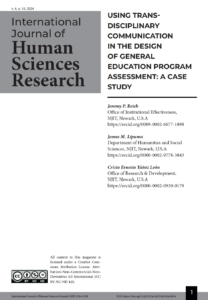Exciting Announcement: Publication in the International Journal of Human Sciences Research
I am thrilled to share our latest publication in the esteemed International Journal of Human Sciences Research. The paper, titled «Using Trans-Disciplinary Communication in the Design of General Education Program Assessment: A Case Study,» is a collaborative effort with distinguished colleagues Jeremy P. Reich, and James Lipuma. It’s an honor to be a part of this paper (Reich et al., 2024).
Paper Abstract:
As part of the federally mandated accreditation process, higher education institutions must periodically assess the effectiveness of general education programs to ensure that students acquire and demonstrate certain essential skills, as defined by their regional accrediting bodies. Facilitating the design and implementation of this assessment process for continuous improvement requires institution-wide engagement and collaboration with faculty from the numerous disciplines that contribute to the general education program’s curriculum. Trans-Disciplinary Communication (TDC) skills are essential for conducting such a complex initiative.
This paper will describe how TDC assisted in the success of this work. The lead author is the Assistant Director for Assessment and Accreditation at New Jersey Institute of Technology (NJIT), an R1 polytechnic university in the U.S.A. In this role, he was required to lead faculty and other stakeholders in redesigning and implementing a new process for assessing NJIT’s General Education Requirements (GER) program outcomes. The GER assessment initiative has fostered engagement with faculty members across various colleges and departments, all contributing to the General Education Requirement (GER) program’s curriculum. This engagement stems mainly from ongoing collaborations with three key groups: The Faculty Senate’s GER Subcommittee, a dedicated GER committee located within the College of Science and Liberal Arts (CSLA) at NJIT, and a diverse group of assessment-focused faculty, staff, and administrators spread across the institution.
This case study has identified specific challenges that can be resolved through the implementation of effective TDC. An example of these challenges was effectively communicating the accreditation requirements, best practices, and the importance of assessing the general education curriculum to a diverse faculty. A literature review of relevant research into the challenges of working with diverse faculty on assessment issues as well as TDC tools and best practices relevant to these challenges, is included. The paper describes the processes implemented and how TDC facilitated progress as part of divulging and translating concepts from assessment across disciplinary boundaries. Finally, the authors present a clear set of conclusions that provide recommendations for others who might engage in this type of collaborative co-design utilizing TDC.
Presented at International Institute of Informatics and Systemics 2023 Summer Conferences Proceedings:
Proceedings of the 27th World Multi-Conference on Systemics, Cybernetics and Informatics: WMSCI 2023 (Reich et al., 2023)
Read Our Paper
You can access our paper in the International Journal of Human Sciences Research, Vol. 4, No. 10, pp. 1-13, 2024. Read here
Acknowledgments
Non-blind reviewers: Regina Collins, Director of Data Analytics, New Jersey Institute of Technology and Yi Meng, Associate Director for Survey, Research, New Jersey Institute of Technology
Disclosure statement
No conflict of interest pertains to the research presented above.
ORCID
Jeremy P. Reich https://orcid.org/0009-0002-6677-1898
James Lipuma https://orcid.org/0000-0002-9778-3843
Cristo Leon https://orcid.org/0000-0002-0930-0179
Copyright
All content in this magazine is licensed under a Creative Commons Attribution License. Attribution-Non-Commercial-Non-Derivatives 4.0 International (CC BY-NC-ND 4.0).
Sources
Reich, J. P., Lipuma, J., & León, C. (2023). Using Trans-Disciplinary Communication in the Design of General Education Program Assessment: A Case Study [Conference paper]. In E. Gaile-Sarkane, S. Hashimoto, N. Lace, B. Sánchez, M. Savoie, & N. Callaos (Eds.), International Institute of Informatics and Systemics 2023 Summer Conferences Proceedings (CLDM_Ds; pp. 122–128). International Institute of Informatics and Cybernetics; /Research/Collaboration & Convergence. https://doi.org/10.54808/WMSCI2023.01.122
Reich, J. P., Lipuma, J., & León, C. (2024). Using Trans-Disciplinary Communication in the Design of General Education Program Assessment: A Case Study [IJHSR]. International Journal of Human Sciences Research, 4(10). /Research/Collaboration & Convergence. https://doi.org/10.22533/at.ed.5584102414034

